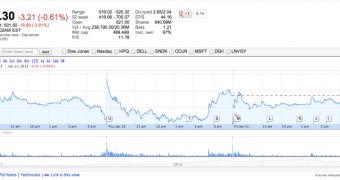As a result of the Wall Street Journal running a story about weak demand for the iPhone 5, Apple’s shares took a 4% tumble to $502 (€375) in pre-market trading today.
Just a few months ago Apple reached $700 (€523) in stock trading on iPhone 5 rumors and excitement. As soon as the device came out, the mixed reviews started rolling in. And so did the low numbers with each passing day.
The Maps debacle didn’t help one bit, and the recent executive shakeup in Cupertino clearly indicates that something is rotten in Denmark.
With Apple’s stock price plummeting $200 in just four months, something is definitely not in its place.
The main reason for the latest drop – a 4% decrease from $520 (€388) on January 11 to 502 (€375) today – is said to be the Wall Street Journal’s report citing poor demand for the iPhone 5.
As a result of this weak demand, Apple has reportedly cut its part orders and its sales estimates, implicitly. If all this is true, investors should prepare for the worst.
Editor’s note
Ever since the passing of Steve Jobs Apple has steadily reduced its pace of innovation.
Whether it’s the absence of the iconic CEO or the products themselves that are failing to rub off on people as they used to, Apple is seemingly beginning to shake.
Under Tim Cook’s lead, Apple has hired and subsequently fired the worst retail SVP (John Browett). The company also lost one of the top executives handling the company’s most profitable business – iOS Chief Scott Forstall.
Some also blame the stock tumble on the iPhone 5 itself, particularly the design. Many consider the phone an unworthy successor to the iPhone 4 and the iPhone 4S, as it brings few to no revolutionary features to the table.
To Apple’s credit, the company’s chief designer did say (on record) that they didn’t just want to make a new iPhone, but that they were trying to achieve “a much better phone.” Which they did, more or less.
But let’s not forget it’s only been about four fiscal quarters since Jobs’ death.

 14 DAY TRIAL //
14 DAY TRIAL //